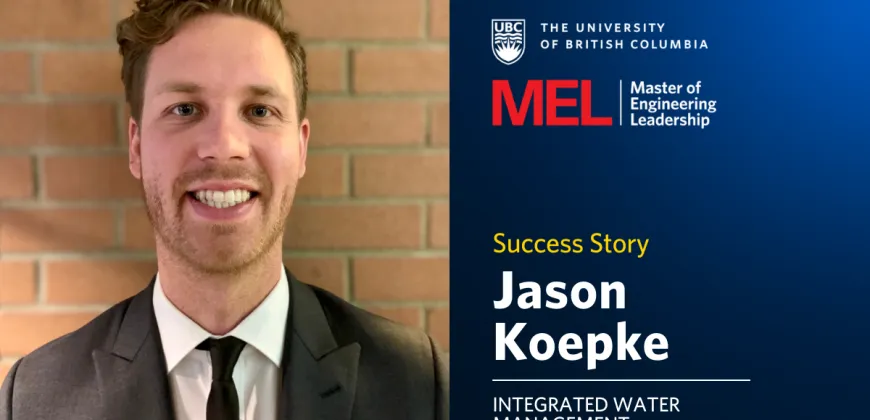Success Story: Jason Koepke
The MEL in Integrated Water Management program was very appealing to now-alumni Jason Koepke, who was interested in pursuing a graduate degree to expand his knowledge of water systems and gain tangible business skills.

Hiring managers in the water management sector are challenged to find employees who have both the technical domain expertise and the project management, communication and leadership skills to successfully guide teams and oversee complex projects.
The UBC Master of Engineering Leadership (MEL) in Integrated Water Management was designed to address this need by combining graduate courses that cover the entire spectrum of water management and that are taught by leading researchers from the UBC Faculty of Applied Science with courses on business and leadership through UBC Sauder’s Robert H. Lee Graduate School.
This unique interdisciplinary education made the program very appealing to Jason Koepke, who was interested in pursuing a graduate degree to expand his knowledge of water systems and gain tangible business skills.
After graduating with a degree in environmental science, Koepke worked for close to five years with the environmental consulting company Hemmera on a range of projects – from site water remediation to managing spill responses in remote northern communities.
“After my undergrad I lived in Burkina Faso for eight months where I worked on a drinking water project,” says Koepke. “I always knew I wanted to go back to school full-time to expand my knowledge of water treatment and water systems, and after working in consulting for several years, I also thought it would be valuable to learn more about business and management.”
An integrated understanding of water management
Program director Barbara Lence says that the MEL in Integrated Water Management was designed to enable water industry professionals to expand their technical knowledge of water management while gaining fundamental knowledge in business and management.
She says that water management leaders from the private and public sector have told her they struggle to find employees who can implement big projects and deliver on large-scale infrastructure projects in water treatment and delivery. “They’re looking for people who also understand economic and financial considerations in water management, and who are also able to consider the environmental and social equity aspects of water projects, including the ability to collaborate with Indigenous partners and communities.”
This skill set is achieved through carefully sequenced courses on water and wastewater management strategies, hydrology, water resources systems planning and management, chemical and biological water treatment design, environmental fluid mechanics, and water infrastructure project delivery. Students can also take an elective in an area of their interest.
Koepke says the engineering classes expanded his technical knowledge. “I continued to work at Herrera after finishing the program in December 2020, and the material I learned about water treatment design and hydrology was very applicable in my work. I’m now at the City of Vancouver, where I’m part of a team managing sewer infrastructure. Although I am still new to my role, I can see that the knowledge I gained in the degree – everything from fluid mechanics to chemical treatment options – will enable me to make meaningful contributions to projects.”
He believes his high-level understanding of all facets of water management will prove useful throughout his career.
“This degree is not about becoming a technical specialist,” he explains. “It’s about becoming well rounded across the entire spectrum of water management so that you understand the engineering, technology or method under consideration and can make informed decisions, even if you’re not a technical expert in that particular area.”
Strong business leaders and communicators
Leading complex projects and managing interdisciplinary teams requires skills in project management, communication, change management and leadership.
Students in the MEL in Integrated Water Management learn these skills through business and leadership courses taught through UBC Sauder’s Robert H. Lee Graduate School. They take classes on organizational leadership, strategy and innovation, and strategy and leadership. An intense four-week business boot camp exposes students to six core business competencies, from accounting and contract management to business case development, and students can also take an additional business course of their choosing.
Case studies, class discussions and group projects empower students to strengthen their skills in communication, collaboration, leadership and group dynamics.
“I gained so many practical skills on the business side that are enabling me to better manage myself and my projects,” says Koepke.
“For example, I know more about accounting and have more confidence developing and managing budgets. What I’ve learned about project management and operational logistics influenced the way I organized a team of subcontractors. Even something like all the practice you get writing succinct and to-the-point memos has been very useful in daily business communications.”
Making a difference
Koepke speaks highly of the value of the professional master’s degree and the connections he made with his professors and fellow classmates. “The confidence I gained from this degree was massive,” he says.
“I can see the difference in my skills and my ability to explore innovative ways to make improvements to existing processes – which will ultimately enable me to have a greater impact in my job and to make a difference in this sector.”